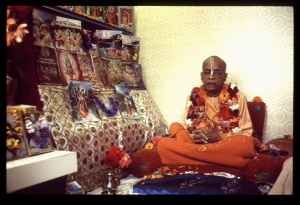SB 6.18.6

A.C. Bhaktivedanta Swami Prabhupada
TEXT 6
retaḥ siṣicatuḥ kumbhe
urvaśyāḥ sannidhau drutam
revatyāṁ mitra utsargam
ariṣṭaṁ pippalaṁ vyadhāt
SYNONYMS
retaḥ—semen; siṣicatuḥ—discharged; kumbhe—in an earthen pot; urvaśyāḥ—of Urvaśī; sannidhau—in the presence; drutam—flown; revatyām—in Revatī; mitraḥ—Mitra; utsargam—Utsarga; ariṣṭam—Ariṣṭa; pippalam—Pippala; vyadhāt—begot.
TRANSLATION
Upon seeing Urvaśī, the celestial society girl, both Mitra and Varuṇa discharged semen, which they preserved in an earthen pot. The two sons Agastya and Vasiṣṭha later appeared from that pot, and they are therefore the common sons of Mitra and Varuṇa. Mitra begot three sons in the womb of his wife, whose name was Revatī. Their names were Utsarga, Ariṣṭa and Pippala.
PURPORT
Modern science is trying to generate living entities in test tubes by processing semen, but even long, long ago it was possible for semen kept in a pot to develop into a child.